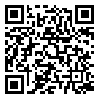Volume 19, Issue 1 (4-2020)
TB 2020, 19(1): 32-47 |
Back to browse issues page
Download citation:
BibTeX | RIS | EndNote | Medlars | ProCite | Reference Manager | RefWorks
Send citation to:



BibTeX | RIS | EndNote | Medlars | ProCite | Reference Manager | RefWorks
Send citation to:
Dadfarnia S, Hadianfard H, Rahimi C, Aflakseir A. Predicting Depression Based on Cognitive Emotion Regulation Strategies. TB 2020; 19 (1) :32-47
URL: http://tbj.ssu.ac.ir/article-1-2947-en.html
URL: http://tbj.ssu.ac.ir/article-1-2947-en.html
Shiraz University , hadianfd@shirazu.ac.ir
Abstract: (5056 Views)
Introduction: In recent years, many studies focused on emotion regulation in conceptualization, explanation, and treatment of mental disorders. Problematic patterns of emotional reactivity and regulation are prominent factors in various mental disorders, specially internalizing disorders. The present study aimed to identify the role of emotion regulation strategies in predicting depression.
Method: This descriptive –correlational research was conducted on 650 students of Yazd University selected by cluster sampling. They completed the Beck depression inventory (BDI-II) and Cognitive Emotion Regulation Strategies Questionnaire (CERQ.) Research data were analyzed in SPSS-22 by Pearson correlation coefficient and stepwise regression.
Results: A significant positive correlation was found between maladaptive emotion regulation strategies (self-blame, rumination, catastrophizing, other-blame) and depression. Adaptive emotion regulation strategies (acceptance, reorientation, plan-focus, perspective taking) were negatively correlated with depression. Results of Stepwise regression showed that self-blame, reorientation, catastrophizing, plan-focus, and other blame could explain 34% of depression variance significantly.
Conclusion: According to the results, emotion regulation strategies can be a significant factor in predicting depression; so, strengthening the adaptive cognitive emotion regulation strategies should be considered in the development and modification of treatments for depression.
Method: This descriptive –correlational research was conducted on 650 students of Yazd University selected by cluster sampling. They completed the Beck depression inventory (BDI-II) and Cognitive Emotion Regulation Strategies Questionnaire (CERQ.) Research data were analyzed in SPSS-22 by Pearson correlation coefficient and stepwise regression.
Results: A significant positive correlation was found between maladaptive emotion regulation strategies (self-blame, rumination, catastrophizing, other-blame) and depression. Adaptive emotion regulation strategies (acceptance, reorientation, plan-focus, perspective taking) were negatively correlated with depression. Results of Stepwise regression showed that self-blame, reorientation, catastrophizing, plan-focus, and other blame could explain 34% of depression variance significantly.
Conclusion: According to the results, emotion regulation strategies can be a significant factor in predicting depression; so, strengthening the adaptive cognitive emotion regulation strategies should be considered in the development and modification of treatments for depression.
Type of Study: Research |
Subject:
Special
Received: 2019/08/5 | Accepted: 2019/09/8 | Published: 2020/04/29
Received: 2019/08/5 | Accepted: 2019/09/8 | Published: 2020/04/29
Send email to the article author
| Rights and permissions | |
 |
This work is licensed under a Creative Commons Attribution-NonCommercial 4.0 International License. |







